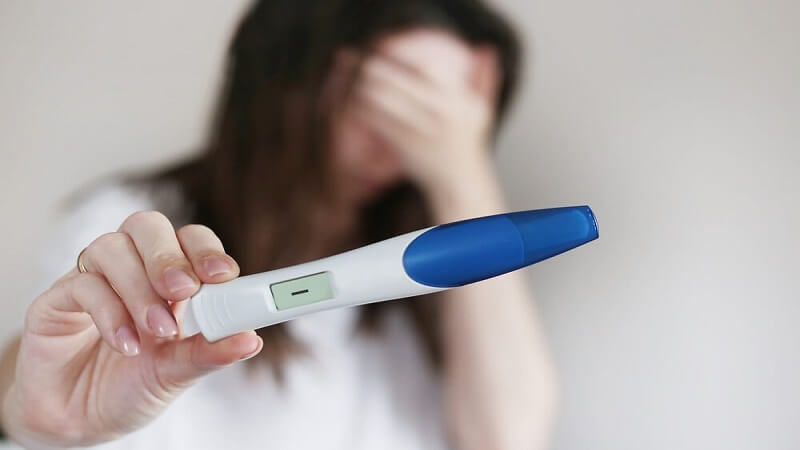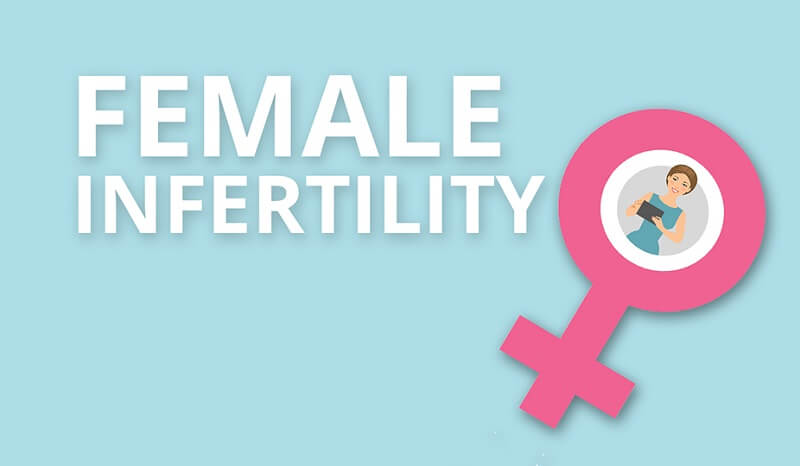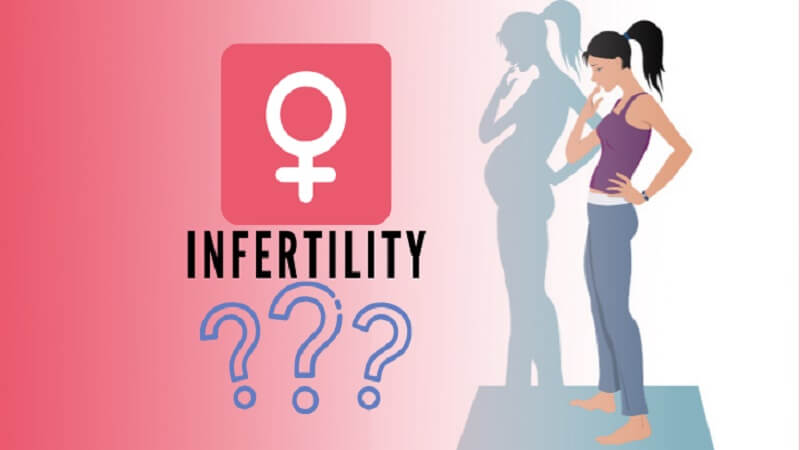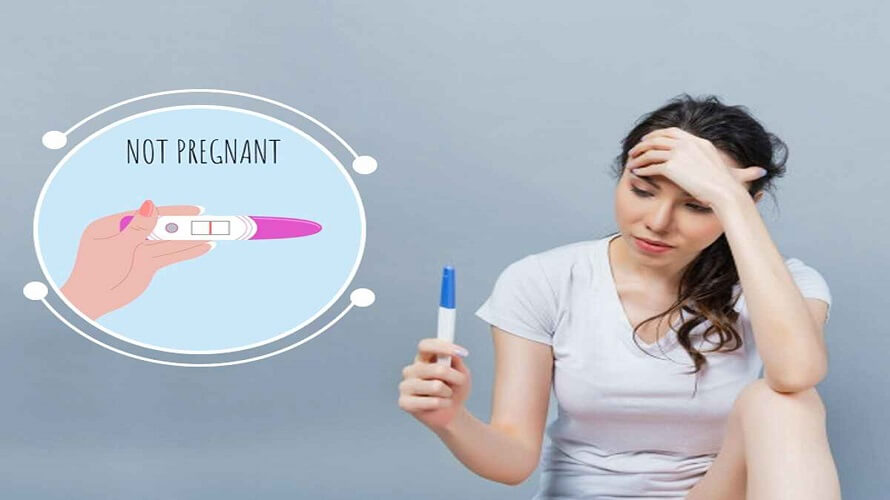Infertility is a condition where even after trying unprotected intercourse for almost a year, a couple is unable to conceive.
Though both male and female partners can be affected by infertility, recent reports have called out women seeing more such cases.
This could be due to various factors!
Generally, there are two types of infertility in females:
- Primary – where women are not able to get pregnant after a full one year of trying frequent unprotected sex.
- Secondary – women have gotten pregnant once but are unable to do so again.
Irrespective of the time, the causes of female infertility remain the same and are grouped into different types.
What Are the Causes Of Female Infertility?
There could be many different causes of infertility in females, and ruling out the exact cause is usually a complex process.
Infertility could either be because of a solitary cause or it could be multifactorial, but the cause is not exceptional from the undermentioned list.

Anatomical and Gynecological Abnormalities
#1. Ovulation problems
A regular menstrual cycle is regulated by many hormones and glands that ensure that ovulation occurs at the right time.
During healthy menstruation, the ovaries release the egg into the fallopian tube where the sperm entering through the cervix penetrates the egg for conception.
But there could be different problems associated with the ovulation process that could lead to infertility among women.
Polycystic Ovary syndrome
Hormonal imbalance could lead to a condition called PCOS characterized by the formation of cysts and blisters in ovaries.
These cysts and blisters often present in the outer region of the ovaries and produce male hormones instead of the follicles releasing eggs.
Hence, either the ovulation is irregular or there is no ovulation at all leading to infertility.
Diminished Ovarian Reserve
It is a condition where there is either less egg production or the eggs produced are of poor quality.
Because of this, the eggs fail to reach the fallopian tube and the woman is diagnosed with infertility.
Though this could be a natural aging process too, the condition is being seen among young women too.
Functional Hypothalamic Amenorrhea
Mainly occurs because of too much stress that inhibits the hypothalamus to produce gonadotropin-releasing hormones.
Since the hormone stimulates the ovaries to produce estrogen for the proper functioning of the endometrium, its deficiency affects fertility.
Premature ovarian insufficiency
It is also known as premature menopause where women below the age of 40 are affected by anovulation.
The ovaries stop producing the eggs and hence result in infertility.
#2. Fallopian Damage
Sometimes due to certain health conditions, the fallopian tubes can get damaged or blocked.
Because of such a condition, there is an obstruction of the passage of mating between the sperm and the egg.
Their failure to meet results in failure in conception leading to infertility.
The common causes of fallopian damage are:
- Scars of abdominal surgery
- Pelvic inflammatory diseases
- Sexually transmitted diseases
Till now pelvic inflammatory diseases have been reported as the most common Causes Of Infertility In Females.
#3. Endometriosis
An anatomical disorder where the endometrium or the inner lining of the uterus is present on the outside of the uterus.
Since the endometrium located outside the uterus acts as extra tissue it can damage and scar the fallopian tubes.
This results in infertility as the passage of the sperm and egg mating gets damaged.
#4. Uterine causes
The two main uterine causes that cause infertility among females are the development of:
- Fibroids – non-malignant tumor growths
- Polyp – uncontrolled growth of tissue mass in the endometrial lining.
These growths usually block the fallopian tubes and hence cause infertility.
Sometimes there could also be an anatomically abnormal-shaped uterus from birth that affects infertility in women.
#5. Cervical Causes
A condition called cervical stenosis often affects fertility as it is characterized by narrowing of the cervix which prevents entry of the sperm.
Sometimes the antibodies present in the cervical mucous too can destroy the sperms by activating the immune system leading to infertility.
This is mainly because of autoimmune disorders.
Medical History and Illness
#1. Obesity
Obesity mainly affects the hormonal balance among women leading to infertility.
Too much fat causes insulin resistance resulting in reduced levels of estrogen in females.
This heightens your risk of irregular menstrual cycles, and can sometimes lead to infertility.
#2. Autoimmune diseases and infertility
There can be many such autoimmune disorders that can cause infertility in females like:
Thyroid diseases – alter the hormonal balance and can cause infertility in females.
Antiphospholipid antibody syndrome – is a cause of secondary infertility among women, as it occurs mainly in women with a history of miscarriage. In this disorder, the body produces antibodies against components of the placenta.
#3. Medications
Sometimes medications used to treat certain medical conditions could give rise to infertility in females by causing hormonal imbalance.
Their long-term use can increase the production of prolactin which induces problems in ovulation.
Some of the common Drugs That Cause Infertility In Females after a long term usage are:
- Immunosuppressants
- Antidepressants
- Antirheumatic drugs
- Non-steroidal anti-inflammatory drugs
Lifestyle Factors
#1. Smoking
A cigarette contains many chemicals like nicotine, cyanide, and carbon monoxide that can fasten the rate of egg degeneration in women.
Once an egg gets degenerated there is no replacement for the egg and hence menopause can occur earlier than the natural age.
Hence, chronic smoking can cause infertility among women.
#2. Alcoholism
Heavy drinking among women could be a possible cause of infertility as it can affect the:
- Ovulation
- Menstrual cycles
- Ovarian reserve
- Can prevent implantation in the uterus causing early loss of pregnancy
However, moderate drinking doesn’t raise such concerns for women.
#3. Irregular sleep cycles
Sleep-deprived women can face irregular menstrual cycles because of disruption in the production of natural hormonal levels.
For example, not getting enough sleep for a long time can cause irregular menstrual cycles to a level where pregnancy becomes difficult.
Genetic and Age Factors
While the other causes of infertility in females can be treated to some extent, what cannot be changed are the genetic and age factors.
Both the gene factors and age are associated with menopause.
If anyone related to your family had early menopause that is before 40, you are highly at risk of experiencing early menopause.
Further, as you age the quality of your eggs decreases with more eggs with abnormal chromosomes not capable of getting fertilized.
Despite these causes, there are still chances of getting the right infertility treatment.
But that’s only possible when you spot the symptoms at an early stage.
Female Infertility Symptoms

Generally, infertility doesn’t show any complex symptoms and hence often goes unnoticed:
Irregular periods
Women have a healthy cycle of 28 days, where they bleed for a maximum of 7 days and ovulation occurs on the 14th day.
The minor ups and downs are healthy with the cycle going short for 21 days or high to 35 days.
But longer or shorter than that is a sign of serious concern.
Read: 8 Reasons For Late Period
Type of bleeding
The intensity of the flow can be a sign of abnormality too.
Though noticing heavy or light periods once in a while shouldn’t be as much of a concern.
But noticing such changes in flow in consecutive cycles is concerning.
Painful intercourse
Sex is meant for pleasure, and pain during sex could be a sign of structural abnormalities that could later cause infertility among females.
The type of discharge
Vaginal discharge talks a lot about your reproductive health.
Noticing abnormal discharge like creamy or sticky discharge could be a sign of an underlying problem.
Signs of hormonal imbalance
The signs of hormonal imbalance like excess growth of hair, changes in the texture of the skin, too much acne, sudden weight gain, and nipple discharge are not normal.
Hormonal imbalance requires medical attention as soon as possible as it could later develop into infertility.
However, these signs could not always be a sign of infertility and hence proper diagnosis is important for planning treatment.
There are several tests that the doctors suggest for confirming infertility in females, which we discuss below.
Female Infertility Diagnosis and Treatment
The diagnosis starts with a medical history where you need to put in all the right information regarding:
- Menstrual periods
- History of pregnancy
- Pelvic pain or abnormalities
- The type of vaginal discharge
- Any past STIs
Based on your medical history and the Female Infertility Symptoms, the diagnosis is done through several examinations.
Diagnosis for infertility in females
Other than physical examination, certain tests help in identifying infertility along with the cause:
Blood tests
These tests are mainly suggested based on any abnormal medical history and are conducted to check for hormonal balance.
The tests carried out are mainly for thyroid, prolactin, ovarian reserve, and even progesterone.
X-ray HSG
The x-ray is done by injecting dye through the cervix.
The x-ray visualizes the movement and the spread of the dye from the cervix towards the fallopian tubes. It’s mainly done to see any fallopian obstruction.
Laparoscopy
Produces imaging for all the reproductive organs.
Saline sonohysterogram
For assessing any abnormal tissue growth like fibroids and polyps.
Based on the results the causes of the infertility are confirmed the treatment is planned accordingly.
Female Infertility Treatment

The treatment is planned according to the main cause of the situation.
#1. Ovarian induction
There are many medications that a doctor prescribes for inducing ovulation. These could be used through oral administration or injections.
Since naturally ovulation is regulated by follicle-stimulating hormones and luteinizing hormones, the medications mimic these hormonal functions.
Injections are mainly synthetic hormones that cause ovulation but have high chances of causing side effects if not taken in the right dosage.
#2. Surgeries
Surgeries are mainly done when there are structural causes of infertility in females like:
- Polyps
- Fibroids
- Endometriosis
- Uterine causes
- Ovarian cysts (mainly drained but can be removed too)
Recently the most common type of surgery used for these cases is keyhole surgery where a laparoscope is used or a hysteroscope.
Sometimes even open surgery is done.
But most of the time, infertility is not treatable by the above methods, and hence assistive reproductive technology is used.
People opt for ART more than they opt for surgeries.
Assistive Reproductive Technology
Assistive reproductive technology uses procedures that retrieve eggs from the ovaries and collect sperm, then handle them in labs.
Usually, the two most common types of ART, intra-cytoplasmic sperm injection are used when there is a case of male infertility.
But for women, in-vitro fertilization is used where the eggs are surgically removed and fertilized with the sperm in laboratories.
The embryo is implanted in the uterus post-fertilization.
There are also some complications of going for the assistive reproduction technology:
- Ovarian hyperstimulation syndrome
- Higher chances of multiple pregnancies
- Premature labor and low birth weight chances are high
- Higher chances of cesarean delivery
Conclusion
Infertility among females has been rising with recent reports from the USA showing 11 percent infertile women for 9 percent infertile men.
This number though high is still curbable if women are educated about the causes and the signs of early infertility.
There could be many causes of infertility affecting women, either affecting them solitary or multifactorial.
But the treatment is still possible as there are several ways with which pregnancy could be achieved.
One such great treatment plan is the assistive reproductive technology that helps women achieve pregnancy with a great success rate.
FAQs
-
Does Female Masturbation Cause Infertility?
Masturbating does not affect fertility. There are just myths about masturbating causing infertility among females.
Irrespective of your genitals, gender, and age, masturbating doesn’t affect fertility at all.
-
How Do I Know If I’m Infertile Female?
One of the main symptoms of infertility is not getting pregnant for one year even after trying unprotected sex for a long time.
Other than that irregular periods, the period flow, and even signs of hormonal imbalance can be indicative of infertility among females.
-
Can I test fertility at home?
Though some of the hormones involved in infertility can only be tested through blood tests you can test for the LH and estrogen at home.
Hence, for checking about your ovulation stage, you can go for at-home tests for LH and estrogen. There are many kits available for at-home tests.
-
How can I boost my fertility?
Here are some natural ways of boosting fertility:
- Eat foods that are rich in antioxidants
- Have a hearty breakfast
- Try cutting the trans fat
- In case you are suffering from the PCOS, cut down on your carbohydrate intake
- Add more fibers to your diet.
- High-fat diet
-
What is the fastest way to get pregnant?
According to experts the fastest way to get pregnant is to have sex once a day, every other day, in the time frame which is either just before ovulation or just after ovulation.

